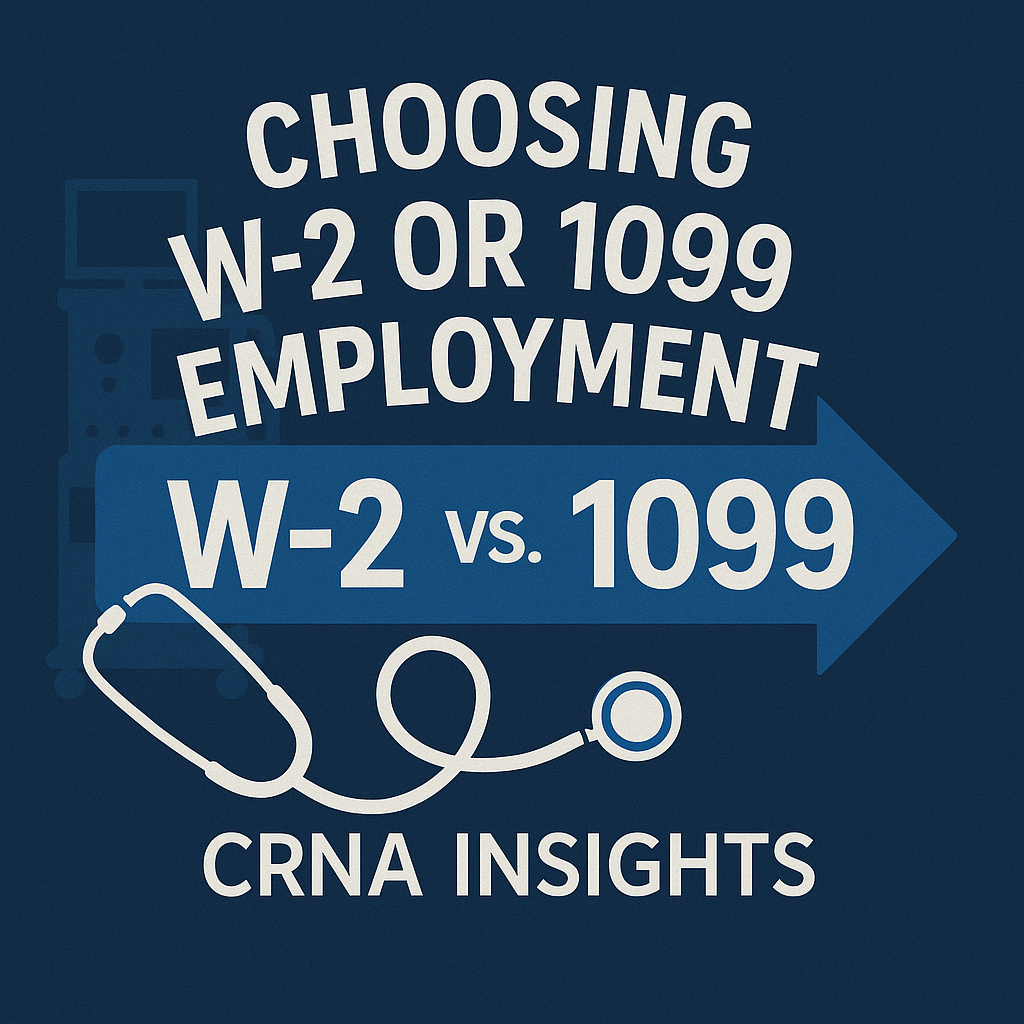We’re all familiar with the saying, “Don’t judge a book by its cover.” However, when it comes to choosing between W-2 and 1099 work, many of us may be guilty of making a snap judgment. On the surface, the financial benefits of the 1099 route may seem more lucrative. But are we missing the wood for the trees?
Drawing from the wisdom of the crowd, I recently polled Certified Registered Nurse Anesthetists (CRNAs) about their preferences between W-2 and 1099 employment. As it turns out, the decision isn’t as cut-and-dry as one might think.
Intangible Benefits: Not All That Glitters is Gold
It’s often the intangibles, the elements we overlook in the dollar and cents conversation, that make a world of difference. “Good leadership, working with nice colleagues, respectful environment,” one respondent explained. This individual’s preference wasn’t rooted in a fat paycheck or a fancy title. It was about the feel of the workplace, the culture, and the quality of their interactions day-to-day. Remember, you can’t put a price on feeling valued and respected.
The convenience and peace of mind that comes with a desired hospital location can also tip the scale toward W-2 work. Another CRNA added, “Uninsurable for disability or life insurance, benefits from a group health policy. There are some things you can’t put a price on.” Sometimes, the less tangible benefits take on a very tangible form when we consider our well-being and security.
Hitting the Benefits Jackpot
You may be scratching your head and thinking, “Alright, but isn’t the whole 1099 allure about me becoming my own boss, setting my own benefits?” That’s a fair point. However, not all of us have the same appetite for self-management.
The simplicity and certainty of W-2 benefits can be a compelling draw. “Retirement benefits, Healthcare, and vacation time. The three big things I don’t get with 1099, as I have to provide it all for myself,” explained one of the polled CRNAs. Keep in mind, administering your benefits isn’t for everyone, and sometimes, the effort can outweigh the perceived financial advantage.
Security & Coverage: The Tug-of-War Continues
When you’re wading through the W-2 versus 1099 conundrum, remember that your career isn’t a sprint; it’s a marathon. Job security and health insurance coverage, while they might not get your adrenaline pumping, should have a place in the equation.
However, not all polled CRNAs agreed. “I can’t think of any [advantages to W-2]. The largest before covid was ‘job security.’ Since then all the W-2 contracts I’ve seen have a ‘force majeure’ clause that gives the company privilege to terminate without notice if they feel the need. If we’re talking permanent vs permanent jobs, I don’t see the attraction,” one respondent stated. It seems that the reliability once associated with W-2 may be wavering for some.
The Vacation Equation
On the other hand, one CRNA countered, “Vacation time is key for me. I can take 10-13 weeks per year without fighting for weeks, and I still make more money. I don’t see ever returning to W2, but everyone’s 1099 experience differs.” Clearly, flexibility is a massive factor in the decision-making process for many.
A Tale of Two CRNAs: A Case Study
There’s nothing like a real-world scenario to put things into perspective. Let’s consider two CRNAs, Alex and Taylor. Alex has been considering a W-2 position that pays $108/hour, while Taylor has been enamored with a 1099 opportunity that pays $135/hour.
Alex’s W-2 Work: More Than Just a Paycheck
At first glance, Taylor’s $135/hour seems much more appealing compared to Alex’s $108/hour. But let’s not be hasty. Alex’s W-2 position also provides six weeks of paid vacation, and 6 days of holiday pay, a 3.5% match to the 403b, and covers the employer portion of the FICA tax and healthcare costs.
After factoring in all these benefits, the value proposition of the W-2 job starts to look very comparable to the 1099 job. The vacation and holiday pay, in particular, boost the overall value of the package. Remember, these are weeks and days Alex is still earning without actively working.
Taylor’s 1099 Route: Greater Gross Income, Greater Responsibilities
On the other hand, Taylor’s 1099 position, while offering more gross income, comes with its set of challenges. Taylor has to take on the full brunt of the FICA tax, lacks employer-provided healthcare and the stability of a retirement plan match. Plus, vacation time is unpaid – an often overlooked but essential factor.
After a thorough analysis, Alex concluded that the W-2 job was financially comparable to the 1099 opportunity. However, Taylor chose to stick with 1099 work – and began seeking a higher-paying opportunity to justify the higher responsibility.
Your Turn: Take the Next Step
Every CRNA’s situation is unique. What makes sense for Alex might not for Taylor, and vice versa. The key is to do the math, understand your priorities, and weigh the pros and cons.
Are you facing a similar dilemma between W-2 and 1099? Would you like an analysis completed to help guide your decision? As your trusted financial partner, we can provide a comprehensive breakdown and insights to help you make the right choice.
Click here to schedule a consultation. Let’s navigate this journey together, ensuring your career choices align with your financial goals and personal well-being.
The Bottom Line
Is 1099 work the superior choice? In terms of gross income, it may seem so. However, we can’t discount the value of the intangible benefits a W-2 position can offer.

